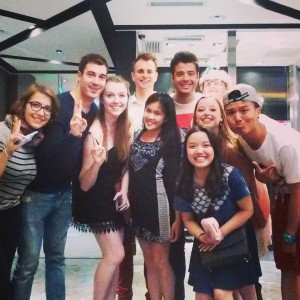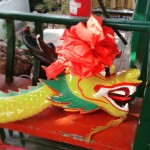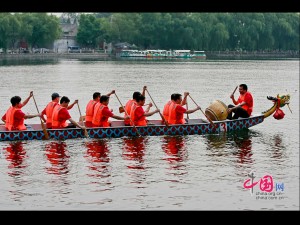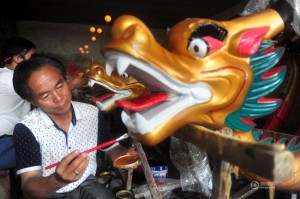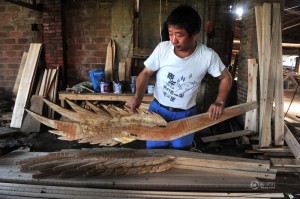端午节
端午节最初是中国人祛病防疫的节日,早期有在农历五月初五以龙舟竞渡举行部落祭祀的习俗。后因诗人屈原在这一天死去,便成了中国汉族纪念屈原的传统节。 因为屈原是跳河而自尽,人们借划龙舟驱散江中之鱼,以免鱼吃掉屈原的尸体。端午节有吃粽子,喝雄黄酒,挂菖蒲等有香气的草木,赛龙舟的习俗。这些习俗都起源于端午节本来的防疫驱邪习俗。
什刹海龙舟赛
端午节那一天我们去北京的什刹海看龙舟赛,这个习俗已流传两千多年。沿湖岸,几十条龙舟。每舟一个鼓手,一个舵手,另有水手约15名。舟上齐唱“嗨哟 嗨哟 嗨哟”。鼓点声响起,喊声震天,龙舟便如一支离弦的箭,在平静无波的塘河上来去如飞.水手动作整齐划一,坚实的肌肉随着动作一起一伏。赛到紧张处,更是精彩异常,两只龙舟齐头并进,争先恐后,岸上的呼声一阵盖过一阵,待到分出胜负,又是一阵的欢呼声夹杂几声懊丧的叹息声.我第一次看龙舟带真是好的一番景象。也是让我想起我在剑桥大学看过的划船比赛。世界各地的人举办基本上一样的习俗! 我那一天也爱上甜甜的小粽子(北方的甜,南方的咸)。
接下来我想讲述位于湖南汩罗市的龙舟厂,下面照片中能看到工人们将几艘已经制作好的龙舟从车间抬出,不久就将装车运往各地。
今年56岁的许桂生出在中国龙舟发愿地汩罗的“龙舟世家”,是这里的厂长。“每年临近端午节都是最忙的,我们请了很多工人,日夜赶工,基本上2天就可以造一个出来。”许桂生说。
显而易见,每一艘龙舟经过好几天的努力才能下水参加比赛。因为特别的面貌而历史上的特征,我想多了解龙舟的来源并文化。希望大家从我的报告中也学到了一些新的关于端午节的事情。
ENGLISH TRANSLATION:
Dragon Boat Festival
Dragon Boat Festival originates from China, and in the beginning was a festival where people for preventing and driving away disease. In early China, dragon boat races were a held by tribes to offer sacrifice to the ancestors on the fifth day of the fifth month of the lunar calendar. Later, it became a traditional festival for the Han people to commemorate the death of the poet Qu Yuan, who died on this date. They took the practice of dragon boat racing to scatter the fish in the river where he killed himself, so the fish would not eat his dead body. People traditionally eat sticky rice dumplings on this day, as well as drinking realgar wine , hanging sweetflag and other potent herbs, and also race dragon boats. These all still relate to the original origins of driving out bad spirits and bringing about good energy.
The boat race on Shichahai lake
On the day of the Dragon Boat Festival, we went to Shichahai lake in Beijing to watch the 2,000 year old tradition of dragon boat racing. On the bank of the lake were roughly ten boats. Each one has a drummer, a helmsman and about 15 rowers. In unison they chanted “Hey ho – hey ho- hey ho”. When the drums began to sound, the crowd sent out an earth shaking roar. The boats set off like an arrow being released from a taught bow string. In the still water they glided as if flying. The rowers movements were on and the same, flexing their muscles in complete unison.
As the race reached its climax, the atmosphere bristled with excitement. Two boats were neck and neck, striving to be the first and terrified of coming second. The shouts from the shore came in waves. When it came to the deciding moment, the cheers of the winning team were interspersed with a few despondent sighs from their opponents. This first time watching the dragon boat race was a real sight to be seen. It also made me think of the rowing races back in Cambridge. It seems that people the world over enjoy similar traditions! I also really enjoyed the sweet dumplings (they are sweet in the north of China, and savory in the south).
I would now like to describe the dragon boat factory in Guluo town, Hunnan county. In the photo beneath you can see the factory workers carrying some finished boats outside, where they are soon to be transported all over the country.
The factory head is a 56 year old man names Xu Gui, who was born into the well known “Dragon Boat Family”, in the birthplace of dragon boats themselves, GuLuo. He loved dragon boats from a young age, and committed himself to being his father ‘s/dragon boat master’s (Xu Yueyun) apprentice. “Every year we become rushed off our feet when it approaches the dragon boat festival. We bring in a lot of outside hands to help, working day and night. We can make one boat in approximately 2 days”, he said.
It is evident that a boat is only ready to take part in the race after many days of careful engineering. I am interested to understand more about their origins and culture, one because of their unusual appearance, and also because of their historical significance. I hope others can learn something new about the dragon boat festival from my report, too.

